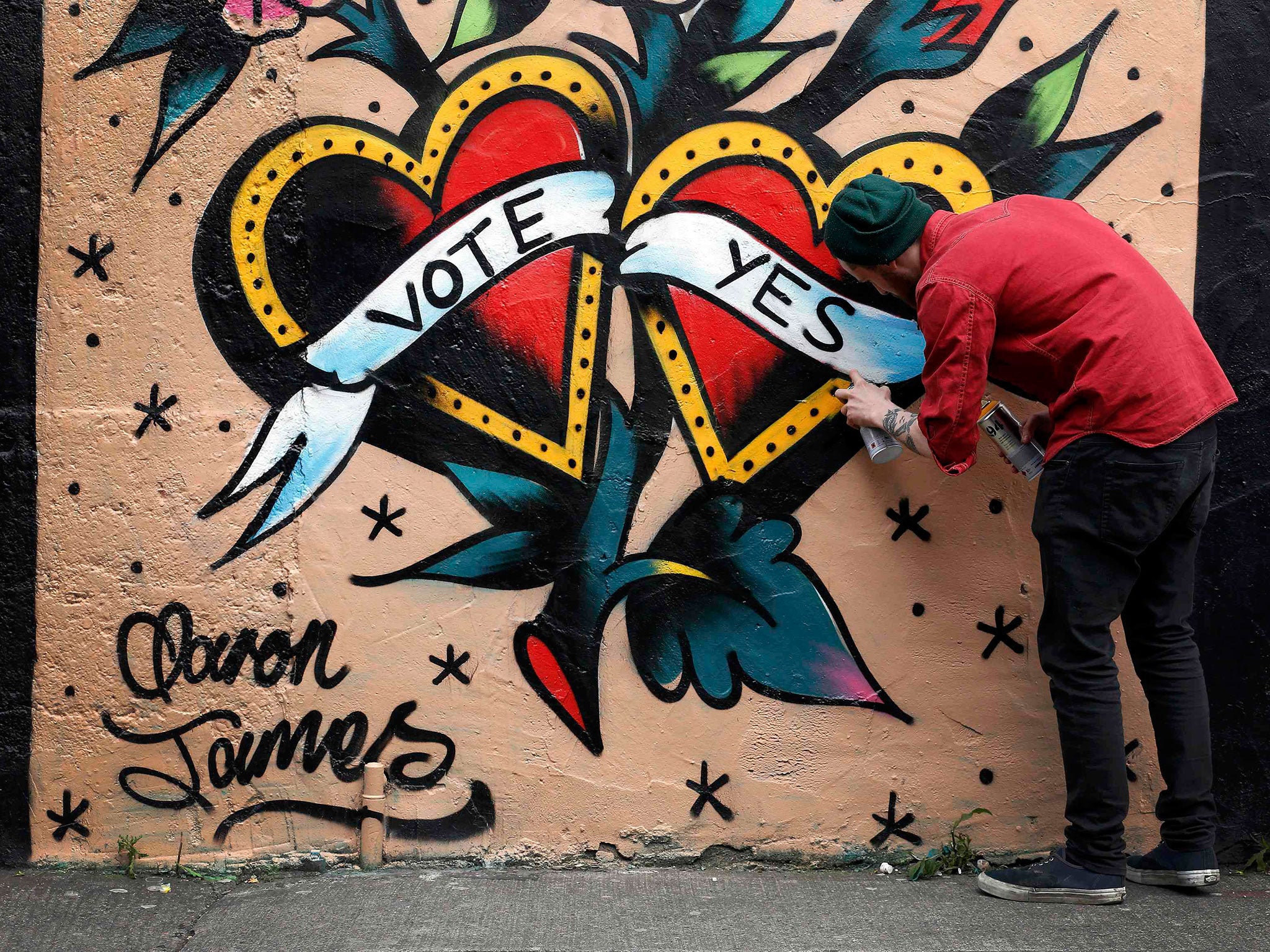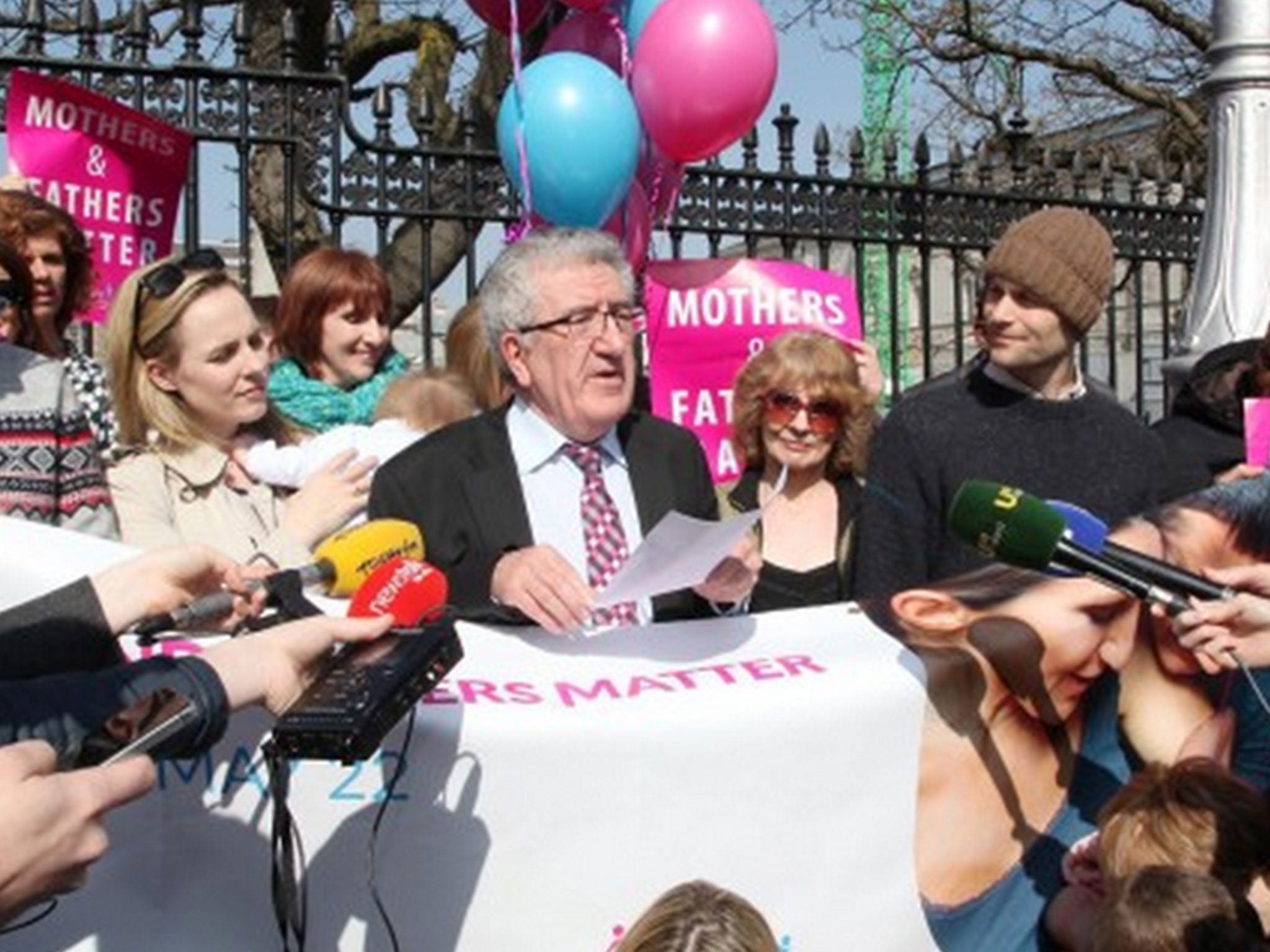Ireland's same-sex marriage vote: Have opinion polls overestimated support for the bill?
As the country has its say, Emily Dugan reports from Donegal and finds that conservatives believe the polls may have got it wrong

Your support helps us to tell the story
From reproductive rights to climate change to Big Tech, The Independent is on the ground when the story is developing. Whether it's investigating the financials of Elon Musk's pro-Trump PAC or producing our latest documentary, 'The A Word', which shines a light on the American women fighting for reproductive rights, we know how important it is to parse out the facts from the messaging.
At such a critical moment in US history, we need reporters on the ground. Your donation allows us to keep sending journalists to speak to both sides of the story.
The Independent is trusted by Americans across the entire political spectrum. And unlike many other quality news outlets, we choose not to lock Americans out of our reporting and analysis with paywalls. We believe quality journalism should be available to everyone, paid for by those who can afford it.
Your support makes all the difference.Brendan Maguire, 53, says he knows exactly how he will vote in Ireland’s same-sex marriage referendum when the polls open. Drinking Guinness in Finn McCool’s pub in the centre of Ballyshannon, Donegal, he said: “It’ll be No. I just don’t think it’s natural. I’m fairly liberal but I don’t think it’s morally right.”
Mr Maguire’s view is one echoed by many in the north-western county of Donegal, which is odds-on to vote against giving gay couples the right to marry. Recent polling has suggested the referendum could see as much as 69 per cent of Ireland voting Yes, but in Donegal such a landslide seems optimistic.
While the streets of Dublin are plastered in Yes campaign placards, and its citizens festooned with pro-gay marriage pin badges, outside of the cities support for the Yes campaign is much less marked.
Driving along the long N4 road to the north-west of the country, the Yes placards which pepper Dublin’s lampposts thin out. Long before crossing into Donegal, No posters become more commonplace than Yes.
The possibility of a “shy” No vote is one that is being much discussed in political circles in Dublin. After the unreliability of polling in Britain’s General Election, pundits in Ireland are worried that the same could happen in this referendum, with embarrassed No voters not being frank about their intentions to pollsters.
The social pressure to at least appear to be sympathetic to the Yes vote is felt across the country following endorsements not just from all major political parties but state bodies too. Even Ireland’s police association, the Garda Representative Association, has come out for Yes, the first time it has taken a partisan position on a referendum.
Margaret Hickey, a spokeswoman for Mothers and Fathers Matter, a group campaigning for the No vote, says there has been reluctance from some to admit they opposed a change in the law. “There is a No voter who is not readily forthcoming,” she told The Irish Times.
“When they realise who you are, they reveal their position. They don’t want to be identified as homophobic or in any way opposed to equality but that is what they are being spun to be.”
In Slevin’s department store in Ballyshannon, Ireland’s oldest town, Mary, 50, is clothes shopping with a friend. She looks uncomfortable at the mention of the referendum and says she is undecided. But further conversation reveals she is in fact fairly certain she will vote No. “I’m thinking down the line if there might be children involved..,” she trails off, referring to No campaign concerns about gay adoption and surrogacy.
Gladys Hughes, 40, is more unequivocal. Clutching her three-year-old daughter Tia, she says “Oh I’ve made my mind up. It’s No. It’s about gay marriage isn’t it? That’s not right.”

Not everyone is against the idea, however. Shopping for dinner in Walsh’s butchers, full-time carer Una Goodwin, 48, is certain that a Yes vote is the right way to go. “My vote would be Yes. Everybody has a right to love and to get on with their lives,” she said.
The butcher himself is less certain. Even the mention of the referendum makes him visibly uneasy. He says he is too busy to discuss it, though there is only one customer left in the shop and he seems to be his friend.
This reticence to even discuss the issue is common, though when it comes to a private ballot many may express their feelings.
While there is no county-by-county polling, bookmaker Paddy Power has listed the two Donegal constituencies as the most likely in the country to vote No. Donegal North East has odds of 10/3, while Donegal South West is at 9/2. Nationally the odds of the referendum failing are 4/1.
Some of the reasons for Donegal’s likely No vote come down to anti-Dublin politics. Donegal has a history of rejecting government-recommended referenda. It was the only county to vote against the Lisbon Treaty and almost 60 per cent of voters in its two constituencies voted No in the divorce referendum.
Mr Maguire in Finn McCool’s pub puts it simply: “Up here they all say we’re different. If it comes for voting for what the government wants, generally speaking, Donegal will vote the other way. We have been neglected for not only years but decades.”
Disproportionately affected by the recession, the county has lost trust in central government.
Working behind the counter at Dorrian’s pharmacy, Sinead, 35, says: “I haven’t made my mind up. It’s the surrogacy issue [the No campaign has stoked fears that the new law will see a sudden surge in gay couples wanting to start families using surrogacy].
“You have to trust the government’s word that they’re going to deal with it [pass a law on surrogacy]. We have merit for why we don’t trust the government. There’s a lot of unemployment here. look at this town; there’s not even a supermarket. Everything is focused on Dublin and other cities and people here feel neglected.”
In the faded coastal town of Bundoran up the road from Ballyshannon, the Breslin family have run the Post Office shop for generations. They are split on the issue along generational lines. Dan Breslin, in his eighties, who previously ran the shop, says he is going to vote No. “It’s family values for me. Mother and father and children are the basis for any family. I’d rather leave it as it is.”
His son Donal Breslin, 40, thinks differently. “I think everyone deserves to be happy in their own lives and to make their own choice. The previous generation are against it because that’s the way they were brought up.”
But while Mr Breslin junior might be sympathetic to the cause of equal marriage, there is one small problem. “I’ve never registered to vote,” he admits, “So I won’t be voting tomorrow.”
In more rural parts of Donegal the No vote will be partly down to the greater influence of the Catholic church. In a letter printed in the Donegal Democrat newspaper, Sally McFadden Carroll, from the village of Gortahork in the remote north of the county, wrote: “I’m trusting God’s word on this one. I am voting No.”
Explainer: The referendum
What will people be asked?
Voters will be asked to approve the following addition to the Irish constitution: “Marriage may be contracted in accordance with law by two persons without distinction as to their sex.”
Why is there a referendum?
Ireland will be the first country to use a national referendum to extend marriage rights to gay couples. It had to put it to the public vote because of its extensive written constitution which requires a referendum for any changes to be made. The constitution does not define marriage as being between a man and a woman, but legislation could have been open to legal challenge in the Supreme Court.
What is the likely outcome?
A poll of polls by broadcaster RTE found that all surveys resulted in a Yes victory, with predictions ranging from 53 per cent to 69 per cent in favour. However, the polls also suggested that the number of people moving from a Yes to a No was increasing this week.
Join our commenting forum
Join thought-provoking conversations, follow other Independent readers and see their replies
Comments